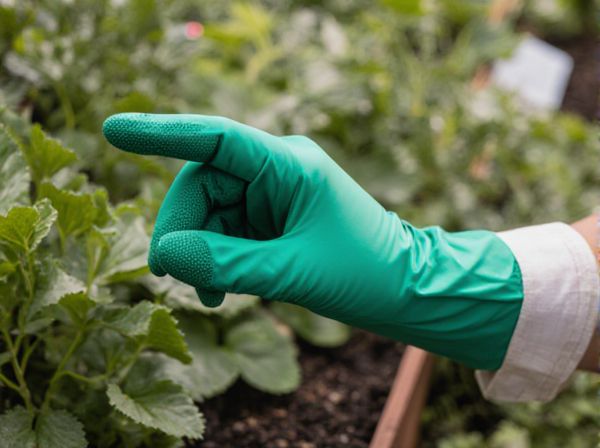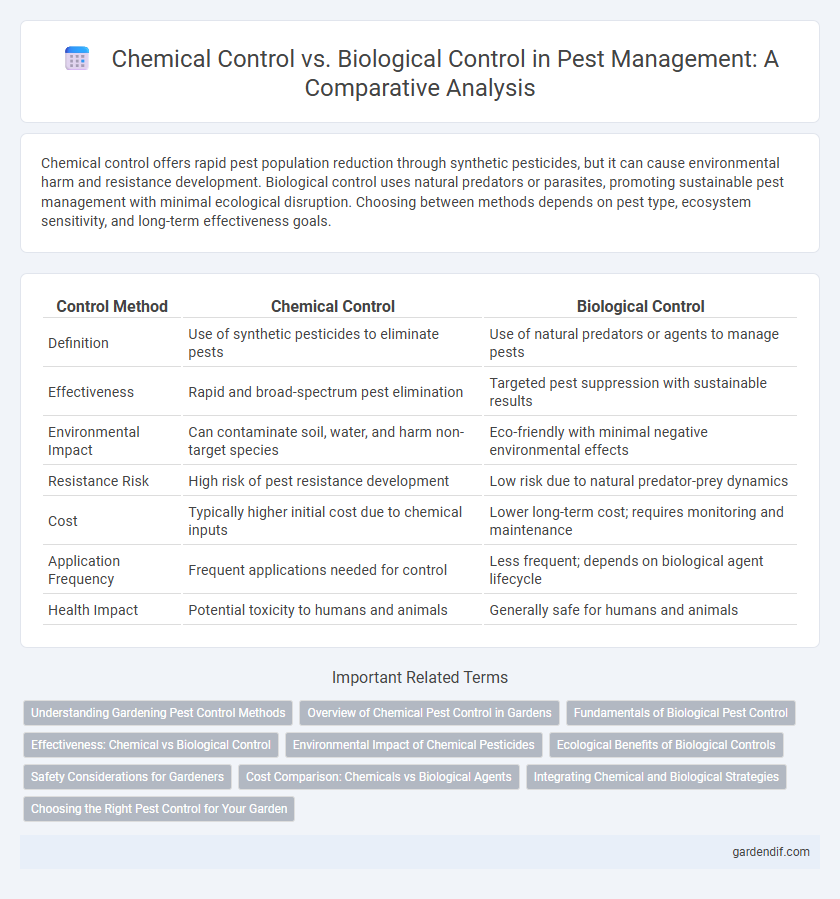
Chemical control vs Biological control Illustration
Chemical control offers rapid pest population reduction through synthetic pesticides, but it can cause environmental harm and resistance development. Biological control uses natural predators or parasites, promoting sustainable pest management with minimal ecological disruption. Choosing between methods depends on pest type, ecosystem sensitivity, and long-term effectiveness goals.
Table of Comparison
| Control Method | Chemical Control | Biological Control |
|---|---|---|
| Definition | Use of synthetic pesticides to eliminate pests | Use of natural predators or agents to manage pests |
| Effectiveness | Rapid and broad-spectrum pest elimination | Targeted pest suppression with sustainable results |
| Environmental Impact | Can contaminate soil, water, and harm non-target species | Eco-friendly with minimal negative environmental effects |
| Resistance Risk | High risk of pest resistance development | Low risk due to natural predator-prey dynamics |
| Cost | Typically higher initial cost due to chemical inputs | Lower long-term cost; requires monitoring and maintenance |
| Application Frequency | Frequent applications needed for control | Less frequent; depends on biological agent lifecycle |
| Health Impact | Potential toxicity to humans and animals | Generally safe for humans and animals |
Understanding Gardening Pest Control Methods
Chemical control utilizes synthetic pesticides to rapidly reduce pest populations but may harm beneficial insects and lead to resistance. Biological control leverages natural predators, parasites, or pathogens to sustainably manage pest species with minimal environmental impact. Integrating both methods requires careful monitoring to maintain garden health and promote ecological balance.
Overview of Chemical Pest Control in Gardens
Chemical pest control in gardens involves the application of synthetic pesticides designed to eliminate or manage pest populations rapidly. These chemicals target specific insect species, fungi, or weeds, offering immediate and often cost-effective results with broad-spectrum efficacy. However, reliance on chemical control can lead to environmental contamination, pest resistance, and harm to beneficial organisms, requiring careful management and integrated pest control strategies.
Fundamentals of Biological Pest Control
Biological pest control relies on natural predators, parasites, or pathogens to suppress pest populations, promoting ecological balance and reducing chemical residue in the environment. Unlike chemical control, which uses synthetic pesticides that can harm non-target species and cause resistance, biological methods emphasize sustainability and long-term pest management. Key fundamentals include understanding predator-prey interactions, life cycles, and habitat requirements to optimize the effectiveness of beneficial organisms in agricultural ecosystems.
Effectiveness: Chemical vs Biological Control
Chemical control offers rapid and broad-spectrum pest elimination due to its synthetic compounds, making it effective for acute infestations. Biological control utilizes natural predators, parasites, or pathogens to sustainably reduce pest populations with minimal environmental impact. While chemical methods deliver immediate results, biological control ensures long-term pest management and mitigates resistance development.
Environmental Impact of Chemical Pesticides
Chemical pesticides often cause significant environmental damage through soil contamination, water pollution, and harm to non-target organisms including beneficial insects and aquatic life. Persistent chemical residues can disrupt ecosystems, reduce biodiversity, and contribute to pesticide resistance. In contrast, biological control methods utilize natural predators and pathogens, minimizing ecological disturbance and promoting sustainable pest management.
Ecological Benefits of Biological Controls
Biological control methods utilize natural predators, parasites, or pathogens to manage pest populations, preserving ecosystem balance and reducing chemical residues in the environment. These controls enhance biodiversity by supporting native species and preventing pest resistance commonly associated with chemical pesticides. Ecological benefits also include improved soil health and water quality, as biological control minimizes hazardous runoff and toxic buildup.
Safety Considerations for Gardeners
Chemical control methods often involve synthetic pesticides that can pose health risks such as skin irritation, respiratory issues, and long-term toxicity for gardeners. Biological control utilizes natural predators or pathogens, significantly reducing harmful chemical exposure and promoting safer handling practices in garden environments. Choosing biological control enhances sustainability and protects gardener health by minimizing chemical residues and environmental contamination.
Cost Comparison: Chemicals vs Biological Agents
Chemical control methods for pest management typically incur higher immediate costs due to the purchase of synthetic pesticides and application equipment. Biological control agents, such as predators or parasitoids, often have higher initial research and development expenses but tend to lower long-term costs by establishing sustainable pest populations control. Economic analyses reveal that while chemicals provide quick results, biological agents offer cost-effective and environmentally friendly solutions over extended periods.
Integrating Chemical and Biological Strategies
Integrating chemical and biological pest control strategies enhances sustainable pest management by minimizing pesticide resistance and environmental impact. Targeted chemical applications support natural predator populations, allowing biological controls to thrive and maintain long-term pest suppression. Combining these methods optimizes crop protection efforts while promoting ecological balance and reducing chemical reliance.
Choosing the Right Pest Control for Your Garden
Chemical control offers fast and effective elimination of pests using synthetic pesticides but may harm beneficial insects and the environment. Biological control utilizes natural predators, parasites, or pathogens to reduce pest populations sustainably while preserving ecological balance. Selecting the right pest control method depends on garden type, pest severity, and long-term environmental impact, with integrated pest management combining both approaches often providing optimal results.
Chemical control vs Biological control Infographic

 gardendif.com
gardendif.com